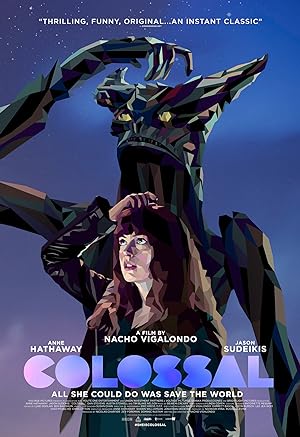I made a conscious decision not to see Colossal in theaters. I like Anne Hathaway, but I’m not wild about her, and despite adoring kaiju films, I knew that it would be a mistake to walk into Colossal expecting Pacific Rim. Even after seeing the film, I’m not entirely comfortable with the premise: an American woman’s dysfunction has materialized and is terrorizing Seoul, South Korea. Considering current events, this premise is either an unwittingly apt metaphor for the US’ role in international politics, specifically with respect to North Korea, and/or an inadvertent, offensive centralizing and disproportionate sense of importance of one’s personal problems and the consequential effect on others. It is all about YOU!
Colossal’s payoff is the ending, which is perfect, so if you can hang on and sustain interest for the entire film, you will be rewarded, but I thought the film was a smidge too long. What the film does well, it does exquisitely: not falling into (romantic) tropes, creating an unexpected villain, providing a small, but plausible back story that explains the premise, and effectively depicting inactive bystanders. Once the film revealed the villain, a lot of events that occurred before made perfect sinister sense in retrospect. I remember when I was young, a friend told me about an ex delivering flowers to her, and I replied that was nice. She corrected me, said it was creepy and explained why. This film gave me that same sensation of reframing behavior that we deem considerate or nice and suddenly recognizing it as sinister and domineering. I know that it is exhausting for the victim to do so, but I always appreciate being corrected and taught to change my perspective so it was not wasted effort.
The most shocking aspect of Colossal is the violence between the characters, not the kaiju. There is a point when a line is crossed, laws are being broken, and no one calls the police or tries to stop it so it keeps escalating and still no one intervenes. It shows how quickly a joke or harmless play becomes sinister, but everyone pretends that it is still a joke because acknowledging the reality is more awkward than actually preventing harm. Feeling awkward is always privileged over actual damage.
Colossal fails at developing another cool possible back story: her career. I read an analysis of the film that pointed out that the main character is a writer. We know that online harassment of women writers is huge and could explain a factor in her downfall. I loved that idea, especially how possibly the villain may have contributed to the online pile on. I love Dan Stevens, but this is the second time that he felt under utilized. I’m glad that the film did not make her like most media depictions of alcoholics—she was still functional and could be seen as partying too hard, but they still made her too likable.
Overall even though I thought the film was well done, I did not enjoy Colossal. It took too long to get to a great destination and made the character too likable for my tastes. I definitely give it points for originality and considerately dealt with the ramifications and consequences of unintentional harm. We know that when disaster hits places like Texas and Florida versus Puerto Rico, location is fraught with significance even when the people, disaster and the resulting damage are technically the same: all Americans, all hurricanes and all debilitating. Ultimately the filmmakers should have chosen another location to wreak havoc on that would be less fraught with the baggage of historic and current international politics.
Stay In The Know
Join my mailing list to get updates about recent reviews, upcoming speaking engagements, and film news.





